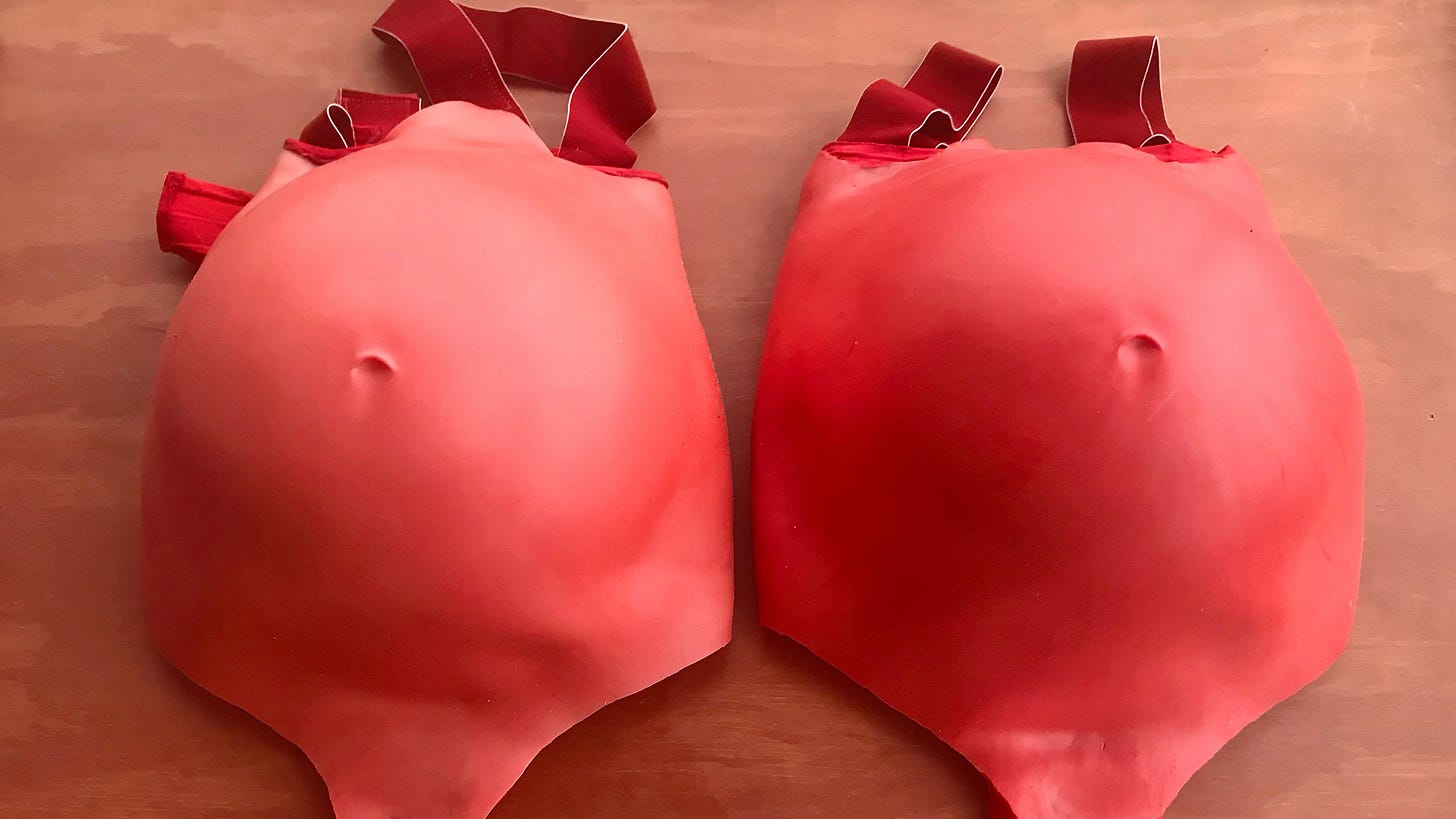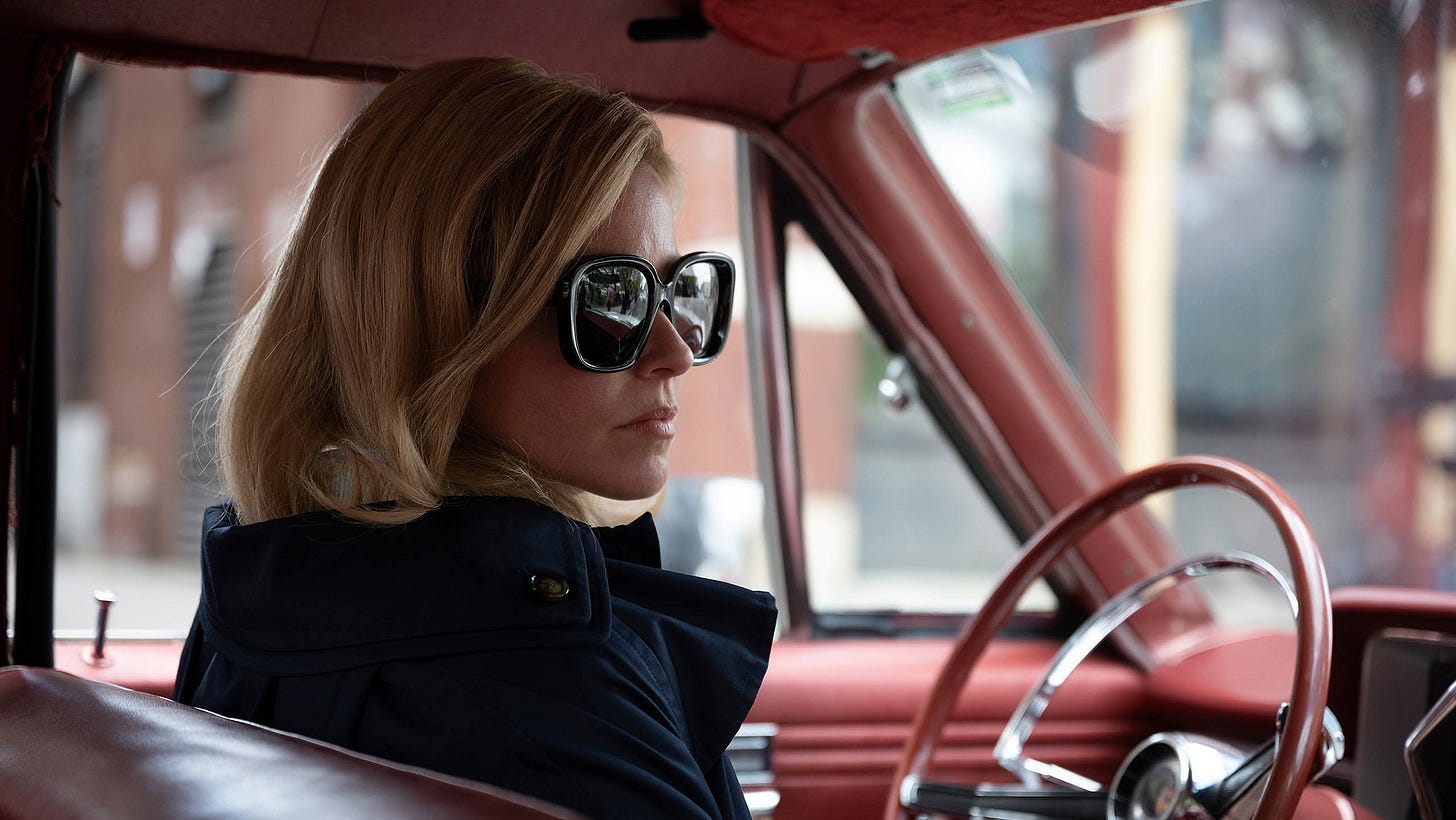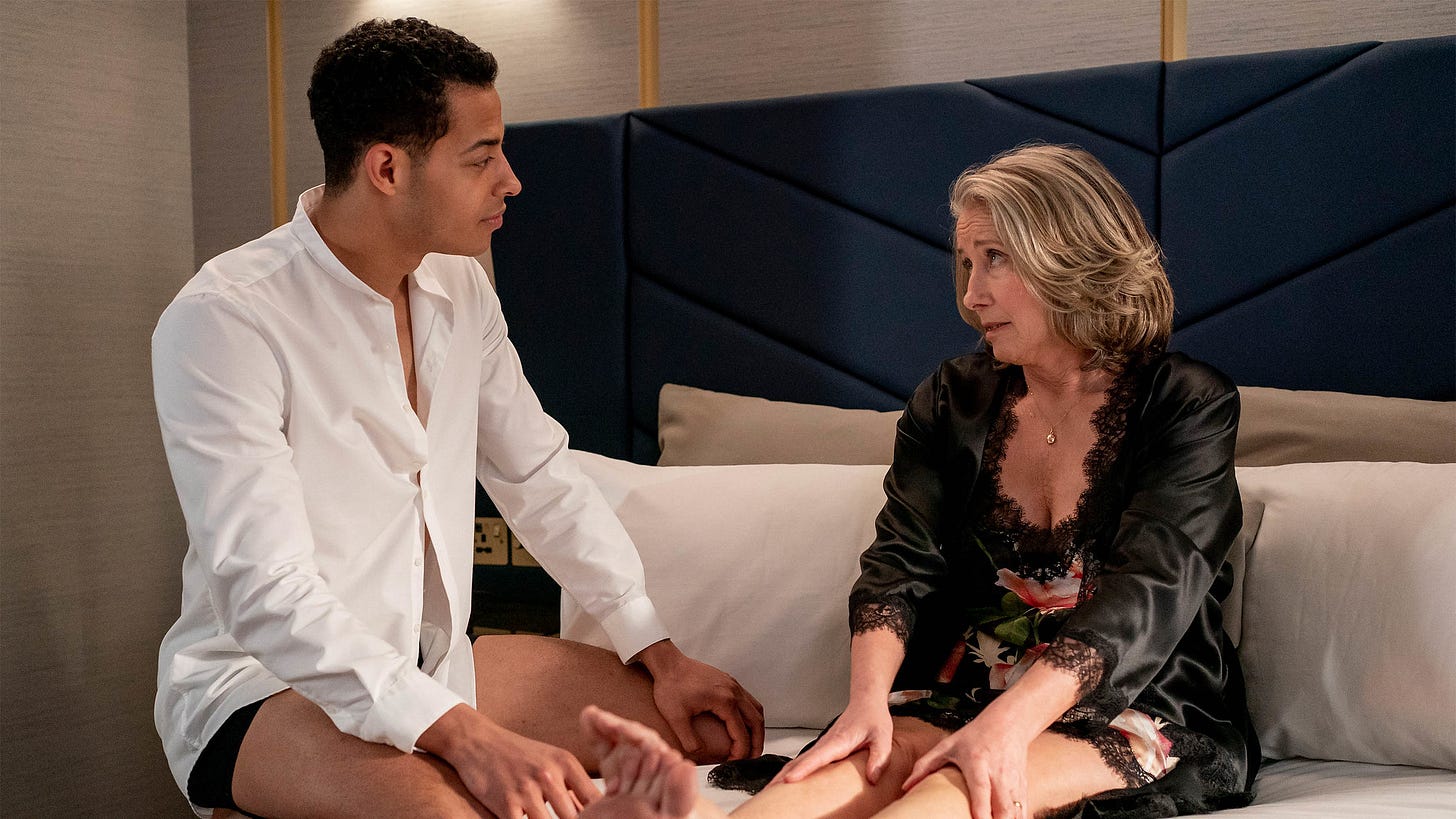Quick heads up that this issue is extra long and will likely be truncated by your email client. For the best experience, read it in your browser!
We promised, and now we’ve delivered! Welcome to Sundance, babes. The two of us have been mainlining films this weekend, and we bring you — well, some notable ones, to be sure. These aren’t necessarily all our favorites, but they were the films that stood out to us.
Oh, and subscribe if you don’t already! Happy Monday!
What Cate’s Been Watching
Fresh
directed by: Mimi Cave | written by: Lauryn Kahn
It’s hard to extol the virtues of Mimi Cave’s debut feature Fresh without giving the whole game away. But suffice it to say, if Showtime’s Yellowjackets enraptured you during its ten-week run, then this is a film you won’t want to miss. Anchored by an assured performance from Daisy Edgar-Jones, what you think is a drama about the perils of millennial dating bifurcates at the 38-minute mark (that’s when the credits kick in) and becomes something altogether more sinister. Expertly managing a near-impossible-to-navigate tonal shift, the story bubbles under with sinister intent, never quite tipping all the way into outright horror. But there are horrors aplenty here and Lauryn Kahn’s solid script gives us a window into the insatiable impulse to consume and commodify women and their bodies. While the execution leaves room for minor improvements, Fresh is a highly commendable debut.
Surrogate
artist: Lauren Lee McCarthy
Part of Sundance’s New Frontier section, Surrogate is a film-cum-live art piece examining the nature of birth, kin, and embodiment. Artist Lauren Lee McCarthy explores her desire to live in the experience of pregnancy through a surrogacy arrangement with hopeful couples. But as the arduous process of being approved to give birth to someone else’s child hits a roadblock, she finds new ways to contemplate the existential reality of creating life. Stylized as a series of continuous vignettes, McCarthy weaves the story of her journey through various media, reflecting on both her own perspectives on bodies and control and those of her contributors. It’s a provocative and insightful work that very nearly demands that the viewer ruminates on their own connection to body — both physical and psychic.
Nothing Compares
directed by: Kathryn Ferguson
Another entry into the ever-growing pantheon of films about women who are owed an apology, Nothing Compares is extremely effective at laying out how Sinead O’Connor found her moral conviction, and why she never abandoned it. Focusing primarily on the 70s and 80s, Nothing Compares tracks O’Connor’s rise in music first as an unassuming singer channeling her rage and then as a genuine, international pop superstar. The film connects her upbringing in theocratic Catholic Ireland with her fighting spirit and unwavering sense of justice, examining the various controversies her career has endured. It’s a fascinating look at a fascinating woman, and more than worth the all-too-brief runtime.
Master
written and directed by: Mariama Diallo
It’s a pity that Master does not live up to its promise because the world that director Miriama Diallo builds is brimming with unrealized potential — in all senses of the word. Set in the world of academia in a storied and historically white university, its three main characters, all black women, must learn to navigate the troubling dynamics of institutionalized racism. The first, a student, arrives on campus brimming with possibility, only to quickly find her status as an outsider repeatedly reinforced. The second (Regina Hall), the school’s first black Master is working to manage the balance between the microaggressions she still faces and the good she hopes to do for other black women behind her. The third, a professor up for tenure, acts as an enigmatic go-between. Her past is a mystery, but her intentions are clear. When racist incidents on campus escalate to violence and an attempted suicide, the characters must face the school’s dark history and create their own fate. But in the toothless Master they never do, leaving planted mysteries unresolved and tightly wound tension to simply fizzle out. In her debut feature, Diallo has a deft handle on the film’s tone and atmosphere, expertly creating the playground for her characters’ fears to manifest. But she never closes the loop on the narrative itself, leading to an unsatisfying and confounding end.
Lucy and Desi
directed by: Amy Poehler
An excellent companion to Amazon’s other film about Lucille Ball and Desi Arnaz, Lucy and Desi fills in the holes Aaron Sorkin artfully created to form the narrative of his own story. Relying heavily on archival photos, videos and recordings, Poehler strings together the meat of the lives of this legendary couple, expanding on the impact they had not just on each other, but on the wider entertainment industry as a whole. With interviews from their collaborators and colleagues, the film hammers home their extraordinary achievements, placing them in the context of their time and recognizing their accomplishments for the unpredictable feats that they were. It is a lovely portrait of a pioneering showbiz couple, that could only have been handled by a director with the reverence that Poehler demonstrates.
What Zosha’s Been Watching
Call Jane
directed by Phyllis Nagy | written by: Hayley Schore & Roshan Sethi
We have, by now, understood that abortion is not as anti-abortion activists make it out to be. It’s not a dangerous procedure, undertaken mostly by teens in trouble. Rather, it’s a safe and necessary medical right; it needs no justification.
Call Jane is, in its own way, an attempt at correcting the narrative: Set before abortion was legalized by the Supreme Court, we follow skittish housewife Joy (Elizabeth Banks) as she attempts to terminate a pregnancy that threatens her life. After finally getting an underground abortion, she joins the network and aids the effort. Director Phyllis Nagy’s eye is careful, using a grainy film look to make everything pop, from the bold, well-lit interiors of the recovery house to the brooding shadows of Joy’s homelife.
It’s an easy film to watch, and maybe that’s my primary problem with it: In the binaristic world of Call Jane, men are there to be cold and uncaring (at best) about those who seek abortions. It’s the sort of choice that not only betrays an underlying political problem, but also renders the story and all its dangers therein far more facile than it deserves to be.
Fire of Love
directed by: Sara Dosa
Right away you can tell Fire of Love is special. There’s the awe-inspiring glimpses of lava, already playfully bubbling and flowing. But it’s the way the camera holds, letting us linger in the silence and survey of the moment. Of course it is here we meet Katia and Maurice Krafft, two volcanologists very much in love with each other and what they do. The documentary traces their life together, the decades they spent scaling summits to better understand how, when, and why volcanoes do what they do.
I’ve seen more than a few people online referring to the heart of this film as the “doomed” love story between the Kraffts. Apologies for using my precious word count as a means to respond to online people but: as Fire of Love shows — between its incredible archive of footage from the researchers themselves and the calm narration from Miranda July — these two devoted themselves and their lives to doing what they loved most. Like so much in this world, volcanoes can feel at once impish, imposing, and indifferent. Fire of Love is a precious film that captures a life’s work that was always in service of never capturing the whole picture.
Good Luck to You, Leo Grande
directed by: Sophie Hyde | written by: Katy Brand
Nancy Stokes (Emma Thompson) has hired an escort, Leo Grande (Daryl McCormack) for sex. She is a teeming cauldron of anxieties, anxiously boiling over as she second-guesses the whole appointment, and then second-guesses herself again. He is soothing, confident, and friendly; this is not his first time. Together, the two of them will feel out a sort of chamber-piece of a film. Their quick natural chemistry allows for the sex work to be both therapy and showcase — for the actors, the nuances of sex work, and the refreshing honesty of intimacy, even with a total stranger.
Ultimately the movie’s biggest struggle is squeezing an unorthodox narrative into something more expected; a rom-com is a fantasy, like the work Leo provides, and both get compressed by the conventions. Leo Grande wins out in the end, for being as charming as it is, but among all the cute healing there is a sense it could be a little more if it wanted to.
Living
directed by: Oliver Hermanus | written by: Kazuo Ishiguro
By-the-book bureaucratic cog Mr. Williams (Bill Nighy, born for this role) is all for just pushing paperwork between departments like clockwork — that is, until he gets a cancer diagnosis that leaves him with six months left to live. Inspired to find some light in his life, Williams sets off to get, well, living.
That description is the best I can do in the bounds of a capsule review, but suffice it to say that Living is much more precious, melancholy, and contemplative than my words can afford it. Based on the Kurosawa movie Ikiru, adapted by the great Kazuo Ishiguro, and directed by Oliver Hermanus, the film lyrically traces the blast radius of Williams’ news. He shares it with almost no one, making Nighy’s performance of a man facing assured death all the more wonderful. Nighy, whose knack for playing button up British men has been used to great effect as both a spoil and a sport, is transcendent. He is the personification of bureaucratic management struggling to remember what there is outside of those confines. It’s an old-fashioned story (and it dips into the obvious at times) but Living is ultimately lovely.
Speak No Evil
directed by: Christian Tafdrup | written by: Christian Tafdrup & Mads Tafdrup
I’m not fully sure I understand who Speak No Evil is for. Billed as a horror movie about a Danish family who goes to stay with their Dutch vacation buddies for a week, it’s the mundane rendered as existential terror: trying to find a resort when you’re lost after dark, feeling trapped in your post-vacation life, or, perhaps most ominously of all, putting your lives in the hands and home of someone else.
For most of Speak No Evil, the injustice comes from the small indiscretions, the little things that needle away but feel awkward for Bjørn (Morten Burien) and Louise (Sidsel Siem Koch) to bring up as they silently clash with Patrick (Fedja van Huet) and Karin (Karina Smulders). Christian Tafdrup expertly makes it so the scenes aren’t filled with dread, but rather the joy (or despair) that can be inspired by regular company.
It relies a bit too much on the idea that niceties would prevent the conclusion, which is inspired and bleak. But the reveal works (even if the ending left me a bit cold) because it’s so unnerving and almost logical in the way it all clicks into place. Still, I’m left a little puzzled: it seems like a film horror fans might object to — in the introduction the director said he wasn’t a big fan of horror films himself — and one those disinclined to the genre would skip.
Assorted Internet Detritus
If you’re just finding this newsletter, do us a favour and subscribe. It feeds our fragile egos. And if you’re already a loyal reader, help us out and tell a friend. And stay tuned for Festival Dispatch #2, coming directly to your inboxes this Friday. Happy movie yelling!
Zosha + Cate <3
twitter:@30FlirtyFilm
instagram:@30FlirtyFilm















